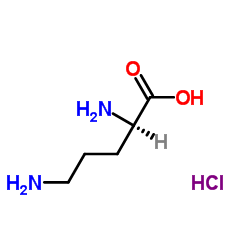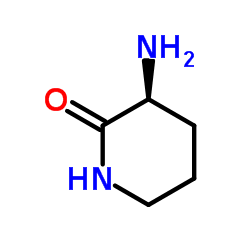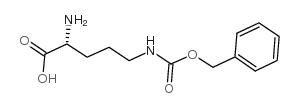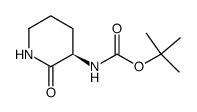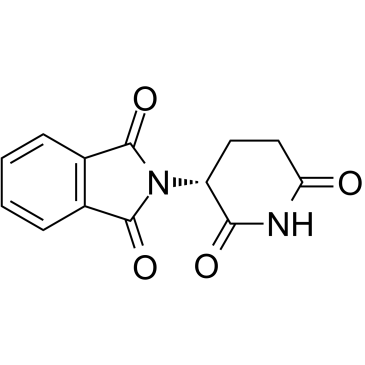16682-12-5
| 中文名 | D-鸟氨酸盐酸盐 |
|---|---|
| 英文名 | D-Ornithine monohydrochloride |
| 中文别名 |
(R)-2,5-二氨基戊酸单盐酸盐
D-盐酸鸟氨酸 (R)-2,5-二氨基戊酸 D-鸟氨酸.盐酸盐 |
| 英文别名 |
L-Ornithine, monohydrochloride
D-Ornithine hydrochloride (1:1) D-Ornithine monohydrochloride L-Ornithine hydrochloride (1:1) (2S)-2,5-diaminopentanoic acid hydrochloride D-Ornithine, hydrochloride (1:1) Z3YZVQ &&L or S Form HCl (S)-(+)-2,5-Diaminopentanoic acid hydrochloride (2R)-2,5-diaminopentanoic acid,hydrochloride L-Ornithine, hydrochloride (1:1) EINECS 240-729-3 D-Ornithine hydrochloride (S)-2,5-Diaminopentanoic acid monohydrochloride MFCD00012917 L-ornithine hydrochloride H-D-Orn-OH.HCl L-Ornithine L-Aspartate Impurity 3 |
| 密度 | 1.165g/cm3 |
|---|---|
| 沸点 | 308.7ºC at 760mmHg |
| 熔点 | 239ºC (dec.)(lit.) |
| 分子式 | C5H13ClN2O2 |
| 分子量 | 168.622 |
| 闪点 | 140.5ºC |
| 精确质量 | 168.066559 |
| PSA | 89.34000 |
| LogP | 1.33980 |
| 外观性状 | 白色粉末 |
| 蒸汽压 | 0.00015mmHg at 25°C |
| 储存条件 | 常温密闭避光,通风干燥 |
| 稳定性 | 常温常压下稳定 避免的物料:氧化物 |
| 分子结构 | 1、 摩尔折射率:33.80 2、 摩尔体积(m3/mol):113.4 3、 等张比容(90.2K):308.3 4、 表面张力(dyne/cm):54.5 5、 极化率(10-24cm3):13.40 |
| 计算化学 | 1.疏水参数计算参考值(XlogP):无 2.氢键供体数量:4 3.氢键受体数量:4 4.可旋转化学键数量:4 5.互变异构体数量:无 6.拓扑分子极性表面积89.3 7.重原子数量:10 8.表面电荷:0 9.复杂度:95 10.同位素原子数量:0 11.确定原子立构中心数量:1 12.不确定原子立构中心数量:0 13.确定化学键立构中心数量:0 14.不确定化学键立构中心数量:0 15.共价键单元数量:2 |
| 更多 | 1.性状:未确定 2.密度(g/mL,25/4℃):未确定 3.相对蒸汽密度(g/mL,空气=1):未确定 4.熔点(ºC):239°C (dec.)(lit.) 6.沸点(ºC,5.2kPa):未确定 7.折射率:未确定 8.闪点(ºC):未确定 9.比旋光度(º):未确定 10.自燃点或引燃温度(ºC):未确定 11.蒸气压(kPa,25ºC):未确定 12.饱和蒸气压(kPa,60ºC):未确定 13.燃烧热(KJ/mol):未确定 14.临界温度(ºC):未确定 15.临界压力(KPa):未确定 16.油水(辛醇/水)分配系数的对数值:未确定 17.爆炸上限(%,V/V):未确定 18.爆炸下限(%,V/V):未确定 19.溶解性:未确定 |
Synonym:D-(-)-2,5-Diaminopentanoic acid hydrochloride; D-(-)-2,5-Diaminopentanoic acid; D-Ornithine, monohydrochlorid Section 2 - COMPOSITION, INFORMATION ON INGREDIENTS
Risk Phrases: None Listed. Section 3 - HAZARDS IDENTIFICATION EMERGENCY OVERVIEW
The toxicological properties of this material have not been fully investigated. Potential Health Effects Eye: May cause eye irritation. Skin: May cause skin irritation. Ingestion: May cause irritation of the digestive tract. The toxicological properties of this substance have not been fully investigated. Inhalation: May cause respiratory tract irritation. The toxicological properties of this substance have not been fully investigated. Chronic: No information found. Section 4 - FIRST AID MEASURES Eyes: Immediately flush eyes with plenty of water for at least 15 minutes, occasionally lifting the upper and lower eyelids. Get medical aid. Skin: Get medical aid. Flush skin with plenty of water for at least 15 minutes while removing contaminated clothing and shoes. Wash clothing before reuse. Ingestion: Never give anything by mouth to an unconscious person. Get medical aid. Do NOT induce vomiting. If conscious and alert, rinse mouth and drink 2-4 cupfuls of milk or water. Inhalation: Remove from exposure and move to fresh air immediately. If not breathing, give artificial respiration. If breathing is difficult, give oxygen. Get medical aid. Notes to Physician: Section 5 - FIRE FIGHTING MEASURES General Information: As in any fire, wear a self-contained breathing apparatus in pressure-demand, MSHA/NIOSH (approved or equivalent), and full protective gear. During a fire, irritating and highly toxic gases may be generated by thermal decomposition or combustion. Extinguishing Media: Use water spray, dry chemical, carbon dioxide, or appropriate foam. Section 6 - ACCIDENTAL RELEASE MEASURES General Information: Use proper personal protective equipment as indicated in Section 8. Spills/Leaks: Sweep up, then place into a suitable container for disposal. Avoid generating dusty conditions. Provide ventilation. Section 7 - HANDLING and STORAGE Handling: Wash thoroughly after handling. Remove contaminated clothing and wash before reuse. Use with adequate ventilation. Minimize dust generation and accumulation. Avoid contact with eyes, skin, and clothing. Avoid ingestion and inhalation. Storage: Store in a tightly closed container. Store in a cool, dry, well-ventilated area away from incompatible substances. Section 8 - EXPOSURE CONTROLS, PERSONAL PROTECTION Engineering Controls: Facilities storing or utilizing this material should be equipped with an eyewash facility and a safety shower. Use adequate ventilation to keep airborne concentrations low. Exposure Limits CAS# 16682-12-5: Personal Protective Equipment Eyes: Wear appropriate protective eyeglasses or chemical safety goggles as described by OSHA's eye and face protection regulations in 29 CFR 1910.133 or European Standard EN166. Skin: Wear appropriate protective gloves to prevent skin exposure. Clothing: Wear appropriate protective clothing to prevent skin exposure. Respirators: A respiratory protection program that meets OSHA's 29 CFR 1910.134 and ANSI Z88.2 requirements or European Standard EN 149 must be followed whenever workplace conditions warrant respirator use. Section 9 - PHYSICAL AND CHEMICAL PROPERTIES Physical State: Powder Color: white Odor: None reported. pH: Not available. Vapor Pressure: Not available. Viscosity: Not available. Boiling Point: Not available. Freezing/Melting Point: 239 deg C Autoignition Temperature: Not applicable. Flash Point: Not applicable. Explosion Limits, lower: Not available. Explosion Limits, upper: Not available. Decomposition Temperature: > 239 deg C Solubility in water: soluble in water Specific Gravity/Density: Not available. Molecular Formula: C5H12N2O2.HCl Molecular Weight: 168.62 Section 10 - STABILITY AND REACTIVITY Chemical Stability: Stable under normal temperatures and pressures. Conditions to Avoid: Incompatible materials, dust generation, strong oxidants. Incompatibilities with Other Materials: Oxidizing agents. Hazardous Decomposition Products: Hydrogen chloride, nitrogen oxides, carbon monoxide, irritating and toxic fumes and gases, carbon dioxide, nitrogen. Hazardous Polymerization: Has not been reported. Section 11 - TOXICOLOGICAL INFORMATION RTECS#: CAS# 16682-12-5 unlisted. LD50/LC50: Not available. Carcinogenicity: D-(-)-Ornithine hydrochloride - Not listed by ACGIH, IARC, or NTP. Section 12 - ECOLOGICAL INFORMATION Section 13 - DISPOSAL CONSIDERATIONS Dispose of in a manner consistent with federal, state, and local regulations. Section 14 - TRANSPORT INFORMATION IATA Not regulated as a hazardous material. IMO Not regulated as a hazardous material. RID/ADR Not regulated as a hazardous material. Section 15 - REGULATORY INFORMATION European/International Regulations European Labeling in Accordance with EC Directives Hazard Symbols: Not available. Risk Phrases: Safety Phrases: S 24/25 Avoid contact with skin and eyes. WGK (Water Danger/Protection) CAS# 16682-12-5: 0 Canada None of the chemicals in this product are listed on the DSL/NDSL list. CAS# 16682-12-5 is not listed on Canada's Ingredient Disclosure List. US FEDERAL TSCA CAS# 16682-12-5 is not listed on the TSCA inventory. It is for research and development use only. SECTION 16 - ADDITIONAL INFORMATION N/A |
|
生态学数据: 通常对水体是稍微有害的,不要将未稀释或大量产品接触地下水,水道或污水系统,未经政府许可勿将材料排入周围环境。
|
| 个人防护装备 | Eyeshields;Gloves;type N95 (US);type P1 (EN143) respirator filter |
|---|---|
| 危险品运输编码 | NONH for all modes of transport |
| WGK德国 | 3 |
| 海关编码 | 2922499990 |
| 上游产品 0 | |
|---|---|
| 下游产品 6 | |
| 海关编码 | 2922499990 |
|---|---|
| 中文概述 | 2922499990 其他氨基酸及其酯及它们的盐(含有一种以上含氧基的除外). 增值税率:17.0% 退税率:9.0% 监管条件:AB(入境货物通关单,出境货物通关单) 最惠国关税:6.5% 普通关税:30.0% |
| 申报要素 | 品名, 成分含量, 用途, 乙醇胺及其盐应报明色度, 乙醇胺及其盐应报明包装 |
| 监管条件 | A.入境货物通关单 B.出境货物通关单 |
| 检验检疫 | P.进境动植物、动植物产品检疫 Q.出境动植物、动植物产品检疫 R.进口食品卫生监督检验 S.出口食品卫生监督检验 M.进口商品检验 N.出口商品检验 |
| Summary | HS:2922499990 other amino-acids, other than those containing more than one kind of oxygen function, and their esters; salts thereof VAT:17.0% Tax rebate rate:9.0% Supervision conditions:AB(certificate of inspection for goods inward,certificate of inspection for goods outward) MFN tariff:6.5% General tariff:30.0% |


